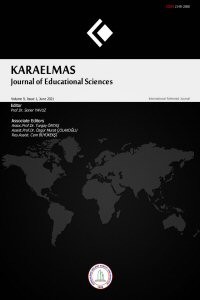Öz-Düzenlemeli Öğrenme Destekli Etkinliklerin Öğrencilerin İngilizce Dersi Başarılarına Etkisi
Bu araştırmanın amacı, öz-düzenlemeli öğrenme destekli öğretimin ortaokul 5. Sınıf öğrencilerinin İngilizce dersi akademik başarılarına olan etkisini incelemektir. Araştırmada deneysel yöntemin ön test, son test kontrol gruplu deseni kullanılmıştır. Araştırmanın uygulaması, 2018–2019 eğitim öğretim yılında ortaokul 5. sınıfta öğrenim gören 56 öğrenciden oluşan örneklem üzerinde yapılmıştır. İngilizce dersi “My town” ünitesinin öğretimi sürecinde yürütülen çalışma, hem deney grubunda hem de kontrol grubunda 4 hafta 12 saat sürmüştür. Araştırmada veri toplama aracı olarak araştırmacı tarafından geliştirilen akademik başarı testi kullanılmıştır. Deney ve kontrol gruplarının aldıkları puanlar bağımlı gruplara t-testi ile karşılaştırılmış, öğrencilerin ön test puanları ile son test puanları arasında anlamlı fark bulunduğunda farkın etki büyüklüğü Cohen’s d değerine bakılarak bulunmuştur. Araştırma sonunda elde edilen bulgulara göre; öz düzenlemeli öğrenme destekli öğretimin öğrencilerin akademik başarı düzeylerinde deney grubu lehine anlamlı farklılıklar sağladığı bulunmuştur. Bu sonuç bize, öz-düzenlemeli öğrenme destekli olarak yapılan öğretimin öğrencilerin akademik başarılarını olumlu yönde etkilediğini göstermiştir.
Anahtar Kelimeler:
Öz Düzenlemeli Öğrenme, İngilizce Dersi, Akademik Başarı
The Effect of Activities Supported by Self-Regulated Learning on Students’ Academic Achievement in English Lesson
The aim of this study is to examine the effect of activities supported by self-regulated learning on academic achievement of 5th grade students. In the research, pre-test and post-test control group design of experimental method was used. The sample group of the study consisted of 56 students who are at 5th grade in middle school in 2018-2019 academic years. The study lasted 4 weeks and 12 hours in both the experimental and control groups during the teaching process of the unit called “My town”. Academic achievement test developed by the researcher was used as data collection tool. The scores of the experimental and control groups were compared to the dependent groups by t-test. When there was a significant difference between the pre-test and post-test scores of the students, the effect size of the difference was found by looking at Cohen’s d value. According to the findings; it was found that teaching supported by self-regulated learning provided significant differences in the academic achievement levels of the students in favor of the experimental group. This result showed that teaching supported by self-regulated learning positively affected students' academic achievement.
Keywords:
Self-regulated Learning, English Lesson, Academic Achievement,
___
- Azevedo, R. (2009). Theoretical, conceptual, methodological, and instructional issues in research on metacognition and self-regulated learning: A discussion. Metacognition and Learning 4(1), 87–95.
- Bandura, A. (1993). Perceived self-efficacy in cognitive development and functioning. Educational Psychologist, 28 (2),117-148.
- Bayrakçeken, S. (2007). Test geliştirme. ölçme ve değerlendirme. Editör: Emin Karip. Pegem A Yayıncılık, Ankara.
- Brecke, R. & Jensen, J. (2007). Cooperative learning, responsibility, ambiguity, controversy and support in motivating students. InSight: A Collection of Faculty Scholarship, 2, 57-63.
- Can, T. & Işık Can, C. (2014). Türkiye’de ikinci yabancı dil öğretiminde karşılaşılan sorunlar. Trakya Üniversitesi Eğitim Fakültesi Dergisi, 4(2), 43-63.
- Cheng, E. C. K. (2011). The role of self-regulated learning in enhancing learning performance. The International Journal of Research and Review, 6(1), 1–16.
- Cohen, J. (1988). Statistical power analysis for the behavioral sciences (2. baskı). Hillsdale, NJ: Erlbaum.
- Ellinger, A .D. (2004). The concept of self-directed learning and its implications for human resource development, Advances in Developing Human Resources, 6(2), 158-177. Doi: 10.1177/1523422304263327.
- Green, S. B., Salkind, N. J. & Akey, T. M. (2000). Using SPSS for window: Analyzing and understanding data. New Jersey: PracticeHall.
- MEB. (2018). İlkokul ve ortaokul 2, 3, 4, 5, 6, 7 ve 8. sınıflar ingilizce dersi öğretim programı kılavuzu. Talim ve Terbiye Kurulu Başkanlığı: Ankara.
- Pintrich, P. R. (2005). The role of goal orientation in self-regulated learning. In M. Boekaerts, P. R. Pintrich and M. Zeidner (Eds.), Handbook of self-regulation (p. 451-502). San Diego, CA: Academic Press.
- Ruban, L. & Reis, S. M. (2006). Patterns of self-regulatory strategy use among low-achieving and high-achieving university students. Roeper Review, 28(3).
- Schunk, D. H. (2009). Öğrenme teorileri, eğitimsel bir bakışla (çev. M. Şahin). Nobel Yayın Dağıtım: Ankara.
- Süer, N. (2014). Öz düzenleme becerilerinin teog sınavı üzerindeki etkisi. Yayımlanmamış Yüksek Lisans Tezi, İstanbul Yıldız Teknik Üniversitesi, Sosyal Bilimler Enstitüsü, İstanbul.
- Ülker, M. (2019). Öz düzenleme ve yansıtıcı düşünmenin matematik başarısına etkisinin incelenmesi. Yayımlanmamış Yüksek Lisans Tezi, Balıkesir Üniversitesi, Fen Bilimleri Enstitüsü, Balıkesir.
- Vardar, A. & Arsal, Z. (2014). Öz düzenleme stratejileri öğretiminin öğrencilerin ingilizce başarılarına ve tutumlarına etkisi. Ana Dili Eğitimi Dergisi, 2(3), 32-52.
- Winne, P. H.(2001). Self-regulated learning viewed from models of information processing. B.J. Zimmerman ve D.H. Schunk (eds). Self-regulated learning and academic achievement: Theoreticalperspectives (ss. 153–189) İçinde, Mahwah, NJ: Erlbaum.
- Zimmerman, B. J. (2001). Theories of self-regulated learning and academic achievement: An overview and analysis. In B. J. Zimmerman & D. H. Schunk (Eds), Self-regulated learning and academic achievement: Theoretical perspectives (pp. 1–38). Mahwah, NJ: Lawrence Erlbaum.
- Zimmerman, B. J. (2002). Developing self-regulated learners beyond achievement to self-efficacy, Washington: American Psychological Association.
- Zimmerman, B. J., & Schunk, D. H. (2001). Reflections on theories of self-regulated learning and academic achievement. In B. J. Zimmerman & D. H. Schunk (Eds), Self-regulated learning and academic achievement: Theoretical perspectives (pp. 1–38). Mahwah, NJ: Lawrence Erlbaum.
- Zimmerman, B. J. (1998). Developing Self-Fulfilling Cycles of Academic Regulation: An Analysis of Exemplary İnstructional Models, In D. H. Schunk and B. J. Zimmerman (Eds.), Self-Regulated Learning: From Teaching to Self-Reflective Practice, New York: Guilford, 1-19.
- Zimmerman, B. J., Bonner S. & Kovach, R. (1996). Developing self-regulated learners, beyond achievement to self-efficacy. Washington: American Psychological Association.
- ISSN: 2148-2888
- Yayın Aralığı: Yılda 2 Sayı
- Başlangıç: 2013
- Yayıncı: Zonguldak Bülent Ecevit Üniversitesi
Sayıdaki Diğer Makaleler
Öz-Düzenlemeli Öğrenme Destekli Etkinliklerin Öğrencilerin İngilizce Dersi Başarılarına Etkisi
Lise Öğrencilerinin Hayvanlara Muameleye Yönelik Tutumları
Sevgi Soysal’ın Romanlarında Kadın Sorunları Üzerine Bir İnceleme
Betül MUTLU, Şenay Meral ZEYTİN
Öğretim Elemanlarının Liderlik Yaklaşımları: Türkiye’deki Yükseköğretim Örneği
Proje Tabanlı Öğrenme Yönteminin Öğrencilerin Üst Bilişsel Farkındalık Düzeyine Etkisi
